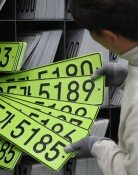Korea sees record high trade deficit in first half
Korea sees record high trade deficit in first half
Posted June. 23, 2022 07:44,
Updated June. 23, 2022 07:44
Korea's trade deficit has stood at 15.4 billion U.S. dollars as of June 20 since early this year, reaching its highest number for the first half of the year, according to Kore Customs Service on Tuesday. Global economic anxieties have impacted car and wireless communication device exports, Korea's main export items, while supply chain disruptions from the Ukraine war have pushed up energy imports such as oil and petroleum products.
If such trade deficit continues, current account balance, which combines balance of goods, service trade and income transfer, may turn into trade deficit. Current account balance as of April showed deficit of 800 billion dollars. Moreover, managed fiscal balance, which should serve as a buffer during difficult times, is expected to hit deficit of 110 trillion won. A double negative deficit, of account deficit and fiscal deficit, is becoming a reality for the first time in 25 years since the Asian financial crisis in 1997.
Double deficits signal has weakened external payment abilities as well as fiscal soundness of Korea's economy, which is the outcome of populist policies and excessive corporate restrictions that brought down business competitiveness. If current account deficit continues amid higher national debt, the value of the Korean won plummets, pressuring consumer goods prices to go up. Above all, double deficits are alarming signs that can impact external credit rating and large capital flight.
Korea faces a dilemma of high inflation while losing production, consumption and investment. If Korea, whose currency is not a key currency and lacks natural resources, falls into double deficit, this raises economic risks and a no-way out solution. The OCED has already revised Korea's outlook downwards, asking to revise fiscal support, structural reform, and reallocation of labor and capital.
Despite such circumstances, the Ministry of Strategy and Finance and the Bank of Korea continue to view poor trade deficits of April as a temporary situation due to foreign investor dividend payment. It is questionable that they are aware of the grave situation where our economic fundamentals are being bottomed out. The authorities should focus all efforts to turn around trade deficits by addressing the needs of businesses and building a safe foundation for the foreign exchange market including the Korea-U.S. currency swap. The trade deficit should be dealt with immediately before it becomes a long-term problem for Korea.
Headline News
- N. Korea launches cyberattacks on S. Korea's defense companies
- Major university hospital professors consider a day off each week
- Italy suffers from fiscal deficits from ‘Super Bonus’ scheme
- Inter Milan secures 20th Serie A title, surpassing AC Milan
- Ruling and opposition prioritize spending amid tax revenue shortfalls







